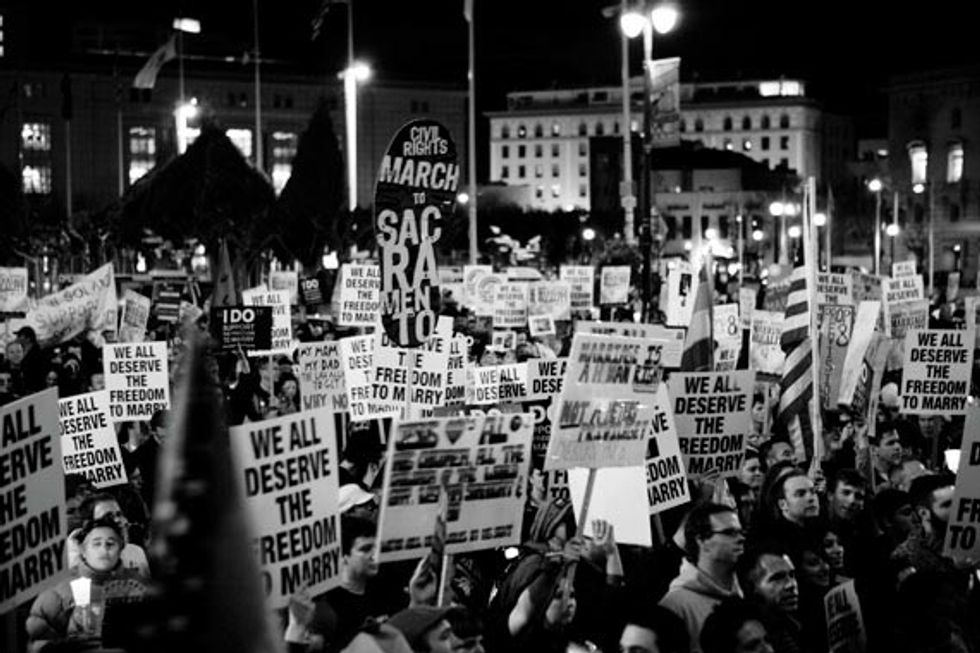Everyone is waiting with Facebook-posting fingers poised for the Supreme Court's biggest decisions to drop as they finish up their current term this month. As is tradition, they save the best for last, meaning that the final week in June is reserved for the most culturally and legally impactful announcements. This year includes not only the verdicts on Prop. 8 and the Defense of Marriage Act, but also decisions about affirmative action and the Voting Rights Act.
If we had to guess, this means that the court will be adding an extra decision day next week, likely on Thursday, June 27, to announce their verdicts regarding gay marriage–much like they did with the surprise decision on Obamacare last June.
What should you expect from the court? Most legal experts agree that whatever happens, this is not going to be a sweeping referendum on marriage equality. Civil rights idealists have painted the picture about the Prop. 8 case as being an obvious issue of justice and equality for all, but it's clear that a majority on this Supreme Court is not ready to rule that way on a federal level when 31 states currently have voter-approved constitutional amendments banning gay marriage. Though we're all encouraged, here in our S.F. bubble, by public opinion polls in recent years that show a growing majority of people in favor of marriage equality, the fact remains that it's been a contentious two decades for this issue. The Prop 8 case, given that it deals specifically with one state's constitution and a voter-approved ballot measure as well as a vital procedural question over whether it should have gotten this far at all, is far from a perfect one to set the stage for change on a federal level.
The good news is, however, that it looks highly likely that we will get legalized gay marriage again in California as early as this summer. But let's not get ahead of ourselves. Below, the various scenarios for how the court may rule, as laid out by City Attorney Dennis Herrera and his spokesman Matt Dorsey (as you may know, the City of San Francisco was a party in the case, known as "Perry" or Hollingsworth vs. Perry). All of these scenarios would mean that Justice Kennedy would have to rule with the liberal wing of the court, or the court makes a unanimous decision based on the procedural question of standing. Also you should consult this very handy and straightforward interactive info-graphic by The New Yorker, which goes through the various outcomes in both cases.
The Gold Medal Scenario(s): The court rules on the merits of the case and affirms the Ninth Circuit's decision, which would invalidate Prop. 8 and either a) potentially invalidate all 31 states' constitutional amendments banning gay marriage, or b) mean that all states that allow civil unions have to call those marriage.
The Silver Medal Scenario: SCOTUS says they should never have taken the case in the first place, which would mean California gets gay marriage and the challengers or other parties can't appeal. This would require Justice Kennedy to rule with the four liberal justices against, presumably, the four conservatives who voted last fall to take the case (in the hope of scaring Kennedy into joining them). This would be an unusual move from the court but perhaps an easy out for Kennedy, who does not sound like he's comfortable with a sweeping decision in favor of gay marriage.
The Bronze Medal Scenario: The court rejects the case on standing, which is the confusing procedural question. Basically it comes down to whether the individuals arguing in favor of Prop. 8 had any right to do so–if they were not representing the state, and they were not being directly harmed by gays marrying, who were they to argue on behalf of the people in the first place? A ruling on standing knocks the case back to California and could mean gay marriage becomes legal again, however it could also mean ongoing battles about whether the Ninth Circuit's ruling applies statewide. (Some pundits and gay marriage proponents are already suggesting that it should only apply to couples involved, or to the counties of Alameda and Los Angeles where the couples in the case reside.)
The Losing Scenario: Justice Kennedy could, sadly, join the conservatives and rule that Prop. 8 is constitutional, which sets the whole movement back at least a decade and will cause many tears.
The silver and bronze scenarios, or some complicated combination therein, are most likely. Kennedy has already indicated that the concept of gay marriage is still too new, culturally, for it to be codified into law on a nationwide basis, and even some of the liberal justices seem to favor the idea of letting this fight work its way through the system, state by state, over time.
And though that might not be as exciting as a broad and sweeping ruling, it will likely mean more happy scenes of gay marriages at San Francisco City Hall starting as early as July or August, pending any further injunctions. Hopefully, the gay marriage haters are exhausted by now, and see the tide turning, and will give up on California following this decision.
On to the DOMA decision, which will be the second piece of news likely to land on the same day as the Prop 8 case, because the court treated the two cases as linked. The case was brought by Edith Windsor, a widowed lesbian living in New York who was legally married in Canada before her spouse died, and who was taxed on her inheritance as if she were single. This case, dealing as it does with a specific injustice around taxation, may provide more hope for elation next week. Most legal pundits heard the justices' oral arguments in March as suggesting that the court will rule against DOMA on a rational basis–basically saying that you can't have legal marriages that aren't treated equally under federal tax law. And this will alone be an extraordinary step forward for marriage equality, basically giving legal recognition to all states' marriages on a federal level, but without declaring that every state has to permit such marriages. Margaret Russell, a law professor at Santa Clara University, tells Deseret News, "I think the court will invalidate that section of DOMA [that defines marriage as between a man and a woman], and it may not even be 5-4."
So, though there is still a small chance that there will be bad news about Prop. 8, most signs point to good news next week for civil rights, the gay community, and everyone who believes that our nation's long fight over gay people getting hitched is just dumb.





















